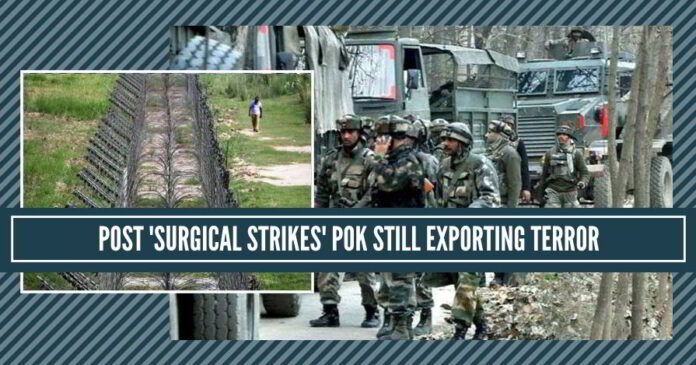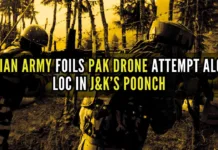
Pushed to the corner Pakistani military establishment may attempt yet another ‘suicidal’ mission from across the line of control by targeting one of the vital security installations in India.
With tensions mounting along the line of control in the run-up to the second anniversary of ‘surgical strikes’ the Indian army was exercising extra caution to prevent any ‘audacious’ cross-border raid by the Border action teams of Pakistan army.
According to security experts, the tone and tenor of Pakistan Prime Minister’s tweet clearly suggested it was drafted by a man in uniform with scant regards and understanding of diplomacy.
Last week an Indian border guard, engaged in the task of grass cutting ahead of the barbed wire fence in Samba sector, was targeted by Pakistani rangers close to the International border. His dead body later recovered by one of the patrol party in a badly mutilated condition.
According to reports after BSF jawan was hit by a sniper shot, he was dragged inside the Pakistan territory where he was subjected to brutal torture. His dead bore remarks of brutal torture along with three bullet wounds. His eyes were gouged out, throat was slit partially and marks of burn injuries were visible on the forearms and legs of the BSF jawan.
Following this gruesome incident when India canceled the Foreign secretary level engagement on the sideline of a United Nations General Assembly session in New York newly appointed Pakistani Prime Minister Imran Khan couldn’t digest the ‘humiliating’ insult and ended up belittling his own stature in the eyes of world leaders by going public with his angst against the Indian leadership.
India foreign office spokesman had cited the “brutal” killing of three policemen in Jammu and Kashmir as well as the release of the postal stamps “glorifying” Kashmiri militant Burhan Wani for calling off the meeting between External Affairs Minister Sushma Swaraj and her Pakistani counterpart Shah Mehmood Qureshi in New York.
External Affairs Ministry Spokesperson Raveesh Kumar had claimed the incidents “exposed” the “true face” of Pakistan’s new Prime Minister Imran Khan to the world as well as Islamabad’s evil agenda behind the proposal for talks.
“Disappointed at the arrogant and negative response by India to my call for the resumption of the peace dialogue,” Prime Minister Khan said in a tweet.
“However, all my life I have come across small men occupying big offices who do not have the vision to see the larger picture,” he said in a sharp reaction to India’s cancellation of the meeting.
Kumar said talks with Pakistan after the “two deeply disturbing” developments would be “meaningless“.
According to security experts, the tone and tenor of Pakistan Prime Minister’s tweet clearly suggested it was drafted by a man in uniform with scant regards and understanding of diplomacy. This also indicated that the military establishment in Pakistan has clearly taken control of even foreign affairs so early in the day and the same does not augur well for the neighboring countries in the South Asia region.
India accepted the proposal but, within hours of its acceptance, news came that terrorists had killed three Indian jawans.
Indian Foreign Minister Sushma Swaraj tears into Pakistan’s propaganda machinery at UNGA.
Exposing real face of Pakistan in front of world leaders Indian Foreign Minister Sushma Swaraj on Saturday, posed a straight question before the august audience, “How can talks be pursued in the midst of “terrorist bloodshed” with a nation that “glorifies killers.”
In a strongly worded speech, Sushma Swaraj hit back at Pakistan saying, “India has made many efforts to have talks with Islamabad and the only reason they have stopped is because of Pakistan’s behavior”.
“We are accused of sabotaging the process of talks. This is a complete lie. We believe that talks are the only rational means to resolve the most complex of disputes. Talks with Pakistan have begun many times. If they stopped, it was only because of Pakistan’s behavior,” she added.
The Indian leader told the world body that after assuming power, Pakistan’s new Prime Minister Imran Khan wrote to Prime Minister Narendra Modi suggesting a meeting between the countries’ foreign ministers on the margins of the General Assembly. India accepted the proposal but, within hours of its acceptance, news came that terrorists had killed three Indian jawans, she said.
“Does this indicate a desire for dialogue,” Swaraj asked.
She informed the General Assembly that various governments in India over the years have tried the peace option. Prime Minister Modi, by inviting the Heads of the SAARC nations to his swearing-in ceremony, had begun his attempt for dialogue on his very first day in office. Swaraj said she too had in December 2016, personally gone to Islamabad and offered a comprehensive bilateral dialogue.
“But soon after, Pakistan-sponsored terrorists attacked our air force base in Pathankot on January 2. Please explain to me how we could pursue talks in the midst of terrorist bloodshed,” she asked.
During the surgical strikes, elite commandos of the Indian army were tasked to smash these terror training camps operating inside Pakistan Occupied Kashmir on September 29, 2016.
GROUND REPORT
The ‘terror factories’ across the line of control in Pakistan Occupied Kashmir (POK) continue to export terror inside the Indian territory.
According to a brigadier rank army officer based in Uri, terror factories located along the line of control continue to impart commando training to fidayeen groups (members of the suicide squad) to wage jihad against the Indian armed forces.
According to the senior army officer at least 250 terrorists were still camping across 27 launching pads to infiltrate inside the Indian territory before mountain passes are closed down due to heavy snowfall in the North Kashmir district of Kupwara.
During the surgical strikes, elite commandos of the Indian army were tasked to smash these terror training camps operating inside Pakistan Occupied Kashmir on September 29, 2016. The Indian forces had successfully penetrated deep inside the enemy territory and smashed these camps, which resulted in heavy causalities.
These strikes were planned shortly after an audacious strike by a fidayeen group of Lashkar-e-Taiba on an army camp in Uri in which 18 soldiers of the Indian army were killed.
According to state police reports around 127 local youth had joined ranks of militant outfits in 2017 and around 140 youth had already picked up the gun this year since January 1, 2018.
What has changed after the surgical strikes?
On ground zero even though the Indian army continues to maintain tight vigil along the line of control to prevent infiltration bids but there has been no let up from the Pakistani side. Between 2016 and 2018 the total number of ceasefire violations have increased manifold. Compared to 228 incidents of ceasefire violations in 2016 over 1000 incidents have been reported so far this year till September end.
At least 27 launching pads remain active and several other terror training camps continue to impart commando training to the new recruits. Armies belonging to the neighboring countries also exchanged heavy firing in Tanghdhar sector shortly after the Indian foreign Minister snubbed Pakistan in front of world leaders.
As per recent police reports the total number of active militants across Kashmir valley hover around 300 and out of this 180 are home-grown terrorists who have joined ranks of different militant outfits in the aftermath of the killing of Hizbul Mujahideen commander Burhan Wani on July 8, 2016.
According to state police reports around 127 local youth had joined ranks of militant outfits in 2017 and around 140 youth had already picked up the gun this year since January 1, 2018.
Note:
1. The views expressed here are those of the author and do not necessarily represent or reflect the views of PGurus.
- Assembly polls in Jammu and Kashmir soon: Modi - April 12, 2024
- Campaign trail: Udhampur-Doda Lok Sabha seat - April 8, 2024
- Ghulam Nabi Azad returns to the poll arena, to contest the Anantnag-Rajouri Lok Sabha seat - April 2, 2024











[…] Post ‘surgical strikes’ terror factories in PoK still exporting terror in India PGurus (satire) (blog) […]
Why can’t India also use sniper attacks on Pakistan soldiers and terrorists to keep inflicting casualties and injuries to the enemy side on a regular basis?
[…] Post ‘surgical strikes’ terror factories in PoK still exporting terror in India PGurus (satire) (blog) […]